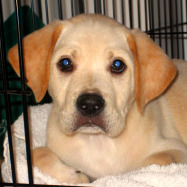Can Dogs Eat Pumpkin?
 Monday, October 26, 2009
Monday, October 26, 2009 Growing up, my parents' dogs were forever gnawing at our jack-o-lanterns, which would send my siblings and me into a full-on meltdown. I'm not sure if my parents ever looked into it (although I hope so), but I got to wondering whether pumpkin is actually safe for dogs to eat. Turns out, it is! In fact, you can even add canned pumpkin (the unspiced kind) to your dog's food to help with digestion "issues."
 Image via k9ring.com
Image via k9ring.com
I'd suggest talking to your vet first just to be sure about what and how much, exactly, you'd be feeding your pet. And be warned, too much pumpkin can cause diarrhea in dogs. (Eew.)
Below are a few stories (and recipes) on the subject, in case you're interested in reading:
ASPCA
http://www.aspca.org/online-community/transcripts/animal-poison-control-chat-transcript.html
Happy Doggie Blog
http://happydoggieblog.wordpress.com/2009/02/28/why-pumpkin-is-good-for-your-dog/
eHow.com
http://www.ehow.com/way_5300690_pumpkin-dog-treat-recipe.html







